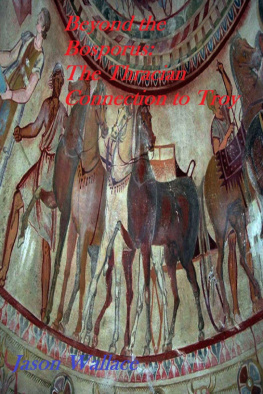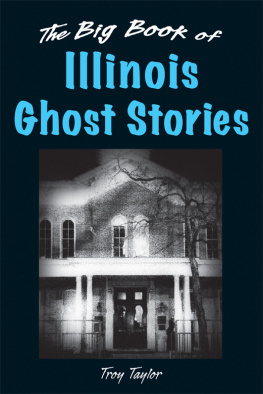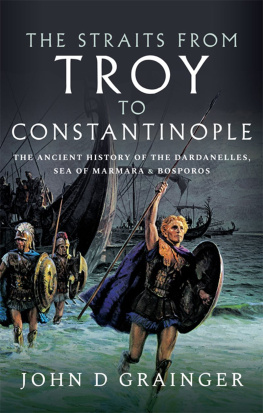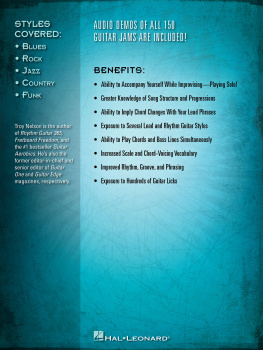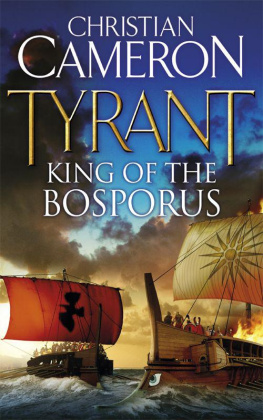Jason Wallace - Beyond the Bosporus: The Thracian Connection to Troy
Here you can read online Jason Wallace - Beyond the Bosporus: The Thracian Connection to Troy full text of the book (entire story) in english for free. Download pdf and epub, get meaning, cover and reviews about this ebook. publisher: JaMa Literary Agency, genre: Politics. Description of the work, (preface) as well as reviews are available. Best literature library LitArk.com created for fans of good reading and offers a wide selection of genres:
Romance novel
Science fiction
Adventure
Detective
Science
History
Home and family
Prose
Art
Politics
Computer
Non-fiction
Religion
Business
Children
Humor
Choose a favorite category and find really read worthwhile books. Enjoy immersion in the world of imagination, feel the emotions of the characters or learn something new for yourself, make an fascinating discovery.
- Book:Beyond the Bosporus: The Thracian Connection to Troy
- Author:
- Publisher:JaMa Literary Agency
- Genre:
- Rating:5 / 5
- Favourites:Add to favourites
- Your mark:
- 100
- 1
- 2
- 3
- 4
- 5
Beyond the Bosporus: The Thracian Connection to Troy: summary, description and annotation
We offer to read an annotation, description, summary or preface (depends on what the author of the book "Beyond the Bosporus: The Thracian Connection to Troy" wrote himself). If you haven't found the necessary information about the book — write in the comments, we will try to find it.
Beyond the Bosporus: The Thracian Connection to Troy — read online for free the complete book (whole text) full work
Below is the text of the book, divided by pages. System saving the place of the last page read, allows you to conveniently read the book "Beyond the Bosporus: The Thracian Connection to Troy" online for free, without having to search again every time where you left off. Put a bookmark, and you can go to the page where you finished reading at any time.
Font size:
Interval:
Bookmark:
Beyond the Bosporus: The Thracian Connectionto Troy
By Jason Wallace
Smashwords Edition
********
Published by:
Jason Wallace on Smashwords
Beyond the Bosporus: The Thracian Connectionto Troy
Copyright 2014 by Jason Wallace
At least as early as the settlement of TroyII, the Troad was deeply connected to the Balkan region throughtrade and cultural exchange. Troy acted as a "trading hub" linkingthe Aegean, Anatolian, and Balkan regions. From comparisons ofAnatolian and Balkan ceramics and metal ware, it is obvious thatsimilar cultures existed, stemming from a common origin, thoughboth places had trade goods to offer that the other did notpossess. This does not prove an ethnic tie between these places,though settlers from the Balkans did settle in the Troad and otherregions of Anatolia by the early Iron Age and perhaps, slightlybefore that. The works of Homer, Herodotus, Strabo, and a littleknown figure named Dares share many similarities that indicatepossible kinship ties and alliances between the city of Troy,Mysian and Phrygian settlements in other Anatolian places, and withThrace, the area from which the Mysians and Phrygians are thoughtto have emigrated.
Though the accounts of Strabo may not becompletely accurate because of their antiquity and lack ofverifiability, they offer insights into the ethnic makeup of theTroad and its surrounding areas. According to both Strabo andHerodotus, the Phrygians, known as the Brigians before coming toAnatolia, and other Thracian groups, including the Treres, settledin western and central Anatolia by the time of the Trojan War.Herodotus claims the Phrygians to have emigrated specifically fromMacedonia, though he states that the Phrygians/Brigians only livedamong the Macedonians but were not necessarily Macedonianthemselves. Strabo furthers that after the "sacking" of Troy, thePhrygians, and their cousins, the Mysians, resettled the Troad,having mastery over it, for a time.
According to Strabo, the Mysians, thoughthought to be related to the Phrygians, could have been, in fact,related to the Lydians instead, as the Mysian language may havebeen an admixture of Phrygian and Lydian. This linguistic analysisonly determines that the Mysians may have been a mixture of thosetwo peoples. It does not, however, disprove the kinship between theMysians and the Phrygians.
Interestingly, the Phrygian language bearsmuch more resemblance to the modern Greek language than it does toany other modern language. There is some evidence, however, tosuggest that Phrygian is more closely related to modern Romanianthan it is to modern Greek. Armenian has generally been thought ofas being Thraco-Phrygian, though it bears little resemblance todayto any of the spoken languages of Thrace. It has been proposed thatthe Trojans were actually Phrygians who were accompanied by theancestors of the Armenians. The language bears no resemblance atall to any other Anatolian languages, such as Luwian, Hittite, oreven Lydian.
Modern Armenians of the Lake Van area havebeen genetically tested to have remnant genes of Greek and Phrygianstock from the Balkans. In fact, Herodotus claims the Armenians tobe "settlers from the Phrygians," perhaps related or perhaps merelyhaving migrated with the Phrygians. Lake Van Armenians exhibit thehighest level of Balkan genetics of any Armenian groups, as thisregion was a trade center linking areas farther east with Anatoliaand areas further to the west.
Strabo asserts that Troy was never completelydestroyed, leaving it open to resettlement by these groups. Straboeven goes so far as to say that the Phrygians, before the time ofthe Trojan War, slew the king of Troy and conquered the city,though he seems convinced that the Trojans, after this point, maynot have been of Phrygian stock. This begs the questions of whetheror not there existed in Troy an admixture between Trojans andPhrygians, a Phrygian ethnicity of Trojan royalty and/or leaders,both, or neither.
Numerous similarities exist between theaccounts of Strabo and that of Dares, a supposed Phrygian thatlived in Troy at the time of the Trojan War, lending thepossibility that Strabo took from Dares' account all material thatwas not infused with mythology or that Dares' story was a literarycreation and gleaned largely from Strabo's works. Though Dares'story is interesting and if at all true, sheds much light on themystery that is Troy, its broader connections, and the Trojan War,including its connection to the Phrygians and to the Balkans, it isdifficult to trust for many reasons. Most notably, the earliestaccount of Dares' life is not known to have appeared in writtenform before the medieval age.
However, Dares is mentioned in aFirst-Century A.D. writing by Ptolemy Chennos, and the story,written in Latin, makes sense only as a translation from Greek,given its word structure. The usage of the Latin words acta diurnaalso proposes some likelihood for the story's having taken place,as acta diurna translates as "daily acts," or, in other words,"journal." Also lending some credence to the possibility of aPhrygian named Dares is an account in Book 5 of Virgil's Aeneid, inwhich Dares is listed as a priest of Hephaestus that often sparredin boxing matches with Paris and participated in a match in honorof Patroclus after Patroclus' death at the hands of Hector.
Ignoring the mythology prevalent in Dares'account dealing with Jason's quest for the Golden Fleece and withHeracles' feud with King Laomedon and the subsequent attack on Troyfor Laomedon' s failure to pay Heracles for his services in riddingLaeomedon and his people of a sea monster sent by Poseidon, Daresoffers vital information that may support Strabo's works and viceversa. Some pieces of Dares' story are also similar to or identicalto those of Homer. All of this, however, does not disprove thatDares' account influenced Homer and/or Strabo or that it wasentirely a creation of literature.
Assuming that Dares was a real person and didlive in Troy and survive the city's attacks because he was afollower of the Trojan diplomat Antenor, it is learned that Priambecame king of Troy after the death of his father, Laomedon andlikely had mastery over the Phrygians and their lands or was, atleast, strongly allied with the Phrygians. Dares also claims thatPriam was able to enlist the help of armies from Thrace, somethingthat would not have been possible without a strong tie between Troyand the Balkans. Homer, if he, too, can be trusted as a source,substantiates such alliances, claiming Phrygian, Mysian, andThracian armies allied with Troy. Strabo's work lends support toDares' story in another way. One might wonder how a participant inthe Trojan War survived to tell his tale. Strabo states thatAntenor, Dares' benefactor, survived the war because he aided theGreeks and after the war was over, fled to Thrace.
This account is strikingly close to thatgiven by Strabo. Strabo suggests, though somewhat loosely, thatKing Priam was ruler of what might be termed a confederation ofcities. According to Strabo, King Asius, not the uncle to Hectorthat is mentioned in the Iliad, ruled over Abydus/Abydos, the sameland that Strabo gives as Priam's homeland, yet under the authorityof Priam. According to Dares, a man named "Asius from Phrygia"commanded a battalion of his own men during the Trojan War.
If this Asius was the uncle of Hector, itshows a kinship connection between the Phrygians and either KingPriam or Hector's mother. If this Asius mentioned by Dares is,instead, King Asius of Abydus, it displays the possibility of acommon rule between Abydus and Phrygia. Abydus was in the Troad,and Phrygia was in central Anatolia, proposing once more that theTroad and Phrygia may have both been settled and ruled by Phrygiansand/or other Thracians closely related to the Phrygians. It islikely that the Asius mentioned by Dares is the same Asius fromBook II of the Iliad, the commander of men from Percote, Practius,Sestos, Abydos, and Arisbe.
Next pageFont size:
Interval:
Bookmark:
Similar books «Beyond the Bosporus: The Thracian Connection to Troy»
Look at similar books to Beyond the Bosporus: The Thracian Connection to Troy. We have selected literature similar in name and meaning in the hope of providing readers with more options to find new, interesting, not yet read works.
Discussion, reviews of the book Beyond the Bosporus: The Thracian Connection to Troy and just readers' own opinions. Leave your comments, write what you think about the work, its meaning or the main characters. Specify what exactly you liked and what you didn't like, and why you think so.

